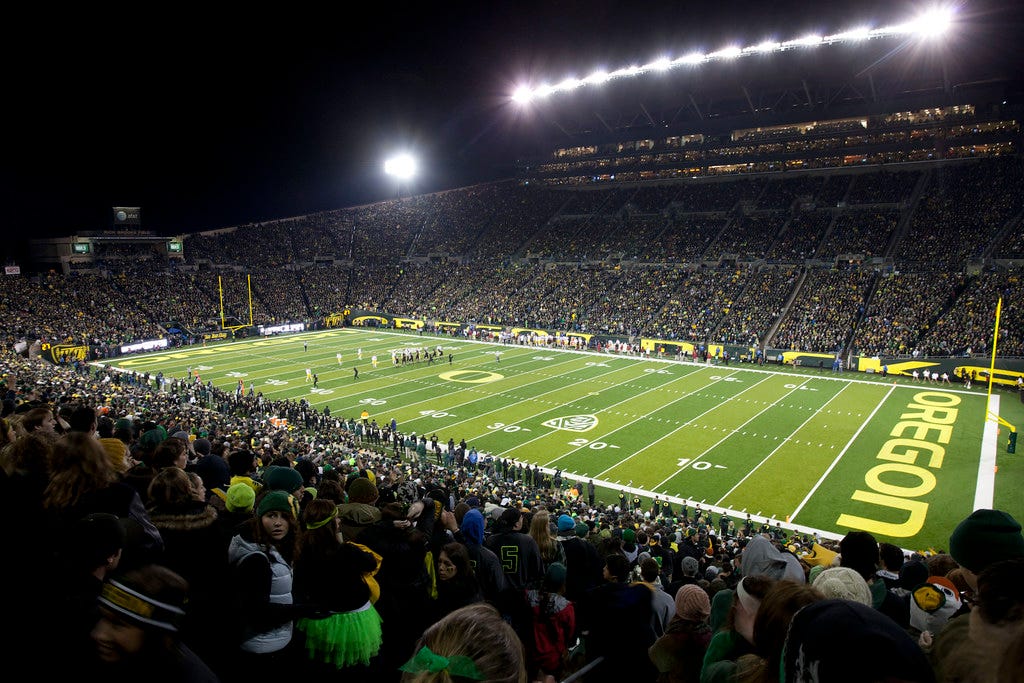Rooting for Better Politics: What Reformers Should Learn From #GoDucks
Like sports leagues, elected leaders need to recognize the need to keep fans (or voters) engaged for positive reasons rather than just providing a platform for people to vent their frustrations.
When I’m introduced to someone I don’t know well, the conversation frequently turns to my 20 years at The Oregonian. Once we hit on that topic, the job I’m most often asked about is sports editor, a role I held for only seven years. There probably are several reasons for that. But almost certainly, it’s at least in part because the other jobs I held were business editor and editorial writer and sports is a more interesting subject to most people than business and a safer topic than politics.
Both of those things need to change if we are going to break out of partisan gridlock. Oregonians need to take a greater interest in government, and they need to be willing to engage in difficult conversations. I think sports shows us how to move forward.
First, why are so many people willing to spend hours poring over statistics and checking injury reports to prepare fantasy football lineups but vote based on instinct, habit or what someone else told them? And that’s if they vote at all. I can be cynical at times, but I’m not cynical enough to think that anyone really thinks the result of a fantasy football game is more important than who wins an election for governor or president.
But, to extend the sports analogy, they might think that all the choices in an election are unpalatable, sort of like a Blazers fans trying to decide who to root for in a game between the Los Angeles Lakers and Golden State Warriors. In that situation, fans generally either tune out or root against the team they hate most – for many Blazers fans, that’s the Lakers.
We’ve seen that same scenario play out in politics in recent years. Numerous studies identify two trends: fewer voters like the two parties and the candidates they offer, and more people vote AGAINST the party or candidate they hate the most rather than for the candidate they like the most. A University of Virginia poll released last week shows just how much ardent supporters of President Biden and former President Trump hate each other. From the survey summary: “A strong majority of Trump voters see no real difference between Democrats and socialists, and a majority of Biden voters at least somewhat agree that there is no real difference between Republicans and fascists.”
Political scientists call this negative partisanship. Sports networks have been familiar with the concept for a long time and have built a business model on promoting it. That’s why teams like the Dallas Cowboys, New York Yankees and Los Angeles Lakers get the most TV exposure. They have a core group of passionate fans (in politics, this would be called the base) and everyone else hates them and therefore tunes in to root against them.
But eventually people lose interest when they think their team doesn’t have a fair chance to win. Sports leagues have devised rules such as salary caps and luxury taxes that limit the advantages franchises in large cities to keep fans of teams in smaller cities from losing interest. The Electoral College works in a somewhat similar way for national elections, but there’s no comparable mechanism in state elections. It’s also open to debate whether the Electoral College currently is working as the Founding Fathers envisioned.
Sports leagues are constantly tweaking their caps, taxes, draft rules, etc. to try to keep small-market teams from being disenfranchised. It’s time for similar tweaks in elections. Ranked-choice voting and open primaries are just two examples of election reforms implemented in a handful of jurisdictions that help more voters feel like their voice counts. Both would improve the relationship between Oregon voters and their government. This improved relationship would be the result of voters, rather than parties, having more control over the final outcome.
But even without election reform, there’s something each of us can learn from sports fans that would improve the electoral system. We need to resolve to focus on areas of agreement and work toward a common goal.
I recently posted a positive comment about the Oregon Ducks football team on Twitter in response to a reporter’s tweet that was critical of the Ducks’ performance, though not unreasonable. The likes and replies I received came from, among others, a union organizer who champions progressive causes, a Republican political operative, someone with strong anti-immigration views who also dislikes Ted Cruz, a conservative Christian and a hip-hop artist. I would not want the task of trying to moderate a political conversation with that group. But in sports they found something that could unite them: #GoDucks.
Similarly, I attended the Ryder Cup in Wisconsin last month. While waiting for golfers to get to the hole where my son and I were watching, fans started talking. Just within hearing distance of me were people from Oregon, Wyoming, New York, California, Mississippi and all the nearby Midwestern states. It’s unlikely everyone held similar political views, though golf does draw from a narrower demographic base than some sports. Yet, the atmosphere was jovial and upbeat. And everyone, except a few Europeans in the crowd, was cheering for America. That rarely happens in politics today, but it still can if we focus on issues where we agree and put more emphasis on achieving those goals than on rooting against “the rival team.”
Mark worked 20 years at The Oregonian in positions including business editor & editorial writer. He currently is a communications consultant.
"Autzen Stadium" by rayterrill is licensed under CC BY-SA 2.0






Excellent, Mark!